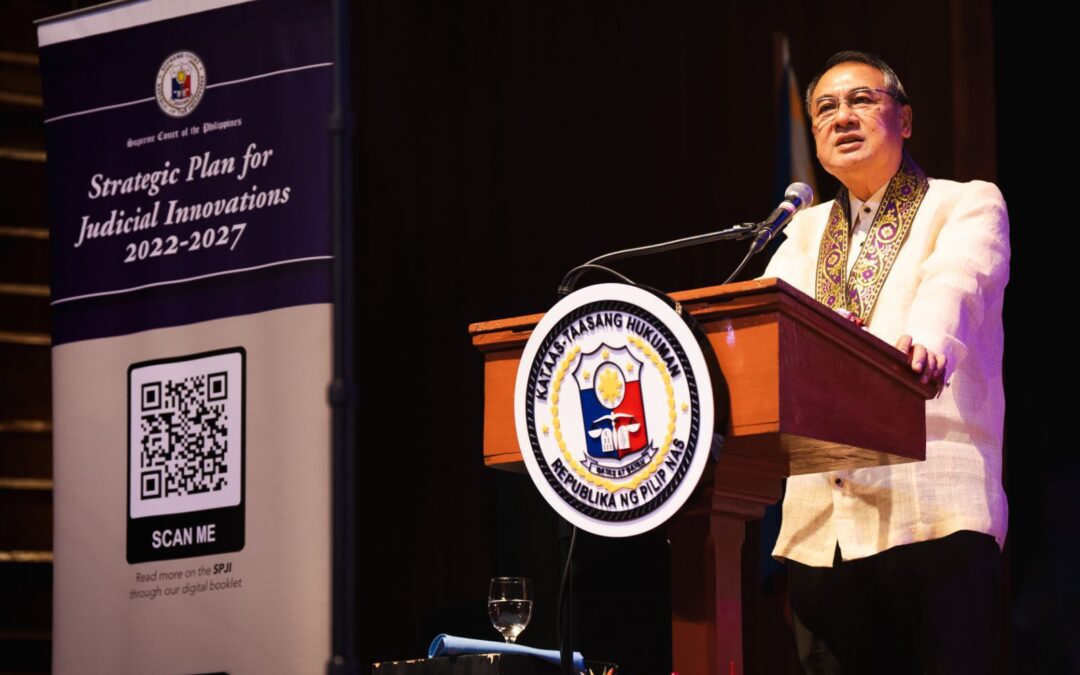“AI could be the magnet that makes [legal] search faster and easier, to the benefit of the people that we ultimately serve.”
Thus remarked Chief Justice Alexander G. Gesmundo as he addressed over 600 members of the Dumaguete legal community during the alumni homecoming of the Silliman University Law Alumni Association (SULAW) on August 26, 2023 at the Claire Isabel McGill Luce Auditorium, Silliman University, Dumaguete City, Negros Oriental.
The Chief Justice highlighted the role of artificial intelligence (AI) in enabling faster and easier access to legal references. “[AI] will usher in the redevelopment of the Judiciary E-Library, which will include AI-enabled tech to improve its legal research capabilities,” said the Chief Justice.
Chief Justice Gesmundo described the current state of legal research as similar to “looking for a needle in haystacks upon haystacks.” Thus, technology must be maximized to improve the process. “Through natural language-processing—the same technology behind ChatGPT—we will install a search engine that will provide more accurate and reliable results; using machine learning, search algorithms will constantly self-improve based on the feedback of users.”
The Chief Justice added, “AI-enabled tech will also generate analysis based on words and phrases, including their context, from previous cases or legal precedents, and predict and suggest possible outcomes for new cases.”
To illustrate how the AI-enabled legal research would work, the Chief Justice presented a video where five different questions were submitted to the AI platform called E-Library Data Assistant, ranging from scenario-based legal queries to a request for a summary of a Supreme Court decision. In each of the questions, the Data Assistant provided a response within 30 seconds.

Sample answer provided by the proposed AI legal research platform to a legal query.
The proposed AI-enabled research tool is currently under further development. It is one of the projects under the Strategic Plan for Judicial Innovations 2022-2027 (SPJI), the Court’s blueprint for judicial reform.
Another ongoing SPJI program shared by Chief Justice Gesmundo is the transformation of trial courts as electronic courts, using the much-improved eCourt version 2.0 software—including functions like e-payments, which can now be done through the Judiciary Electronic Payment Solution (JePS) and e-filing, which started development under eCourt version 2.0 last July.
Other SPJI projects being implemented are: the Philippine Judiciary 365, a modern workplace collaboration solution which provides courts with the facility to electronically receive pleadings and other court submissions securely, hear and decide cases via videoconferencing, generate real-time transcripts of stenographic notes, and organize court calendars, among others; the Bar Applicant Registration Information System and Tech Assistance, or BARISTA, the Court’s online application platform for the 2023 Bar Examinations; the Philippine Judicial Academy Learning Management System, which has made available online traditionally in-person training programs so justices, judges, court officials, and employees can now access on-demand and easily digestible courses at their own pace and convenience; the digitized Benchbook for Philippine Trial Courts, containing updated pertinent laws, treaties, rules, regulations, jurisprudence, and the latest issuances of the Court, each of them searchable, downloadable, user-friendly, and ready for use; and the Human Resource Information System and Financial Management Information System as part of the Court’s upgrading of its systems and processes.
Chief Justice Gesmundo concluded by calling on SULAW and its members to help the Court raise awareness and accelerate the adoption of the SPJI’s reforms for a revitalized and responsive Judiciary. “I enjoin you to be proactive partners in bringing about the future we want for our justice system: one which unfolds under the light of God; where justice is not a dream, but a guarantee; where justice is delivered not in time, not eventually, but in real time.”
The Chief Justice also administered the revised Lawyer’s Oath to the lawyers present at the homecoming.
Chief Justice Gesmundo was joined by Supreme Court Associate Justice Alfredo Benjamin S. Caguioa; Deputy Court Administrator Jenny Lind R. Aldecoa-Delorino, who is an alumna of Silliman University College of Law and recipient of the 2014 Outstanding Sillimanian in the field of Government Service Award in the Judiciary; retired Supreme Court Associate Justice Edgardo L. Delos Santos; and Negros Oriental Regional Trial Court Executive Judge Gerardo Ancheta Paguio, Jr.
Also present were Negros Oriental 2nd District Representative Manuel T. Sagarbarria; Negros Oriental Governor Manuel L. Sagarbarria, Jr.; Dumaguete City Mayor Felipe Antonio Remollo; Silliman University President Dr. Betty C. McCann; Silliman University College of Law Dean and former Solicitor General Atty. Florin T. Hilbay; and SULAW President Atty. Ingrid T. Tinagan. (Courtesy of the Supreme Court Public Information Office)

